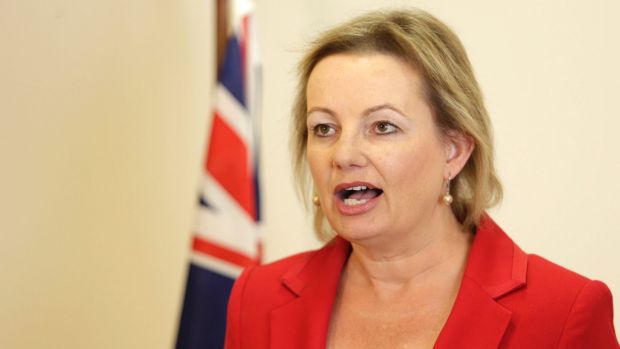
Health Minister Sussan Ley wants to stop “six minute medicine”. Photo: Eddie Jim
Bulk-billing doctors are no more likely to have short consultations with their patients, a study has found, casting doubt on federal government claims that current subsidies encourage “six-minute medicine”.
In a study of 2500 Australians, researchers found patients who had a short consultation with a general practitioner at their last visit were no more likely to be bulk-billed than those who had longer consultations.
The finding comes as Health Minister Sussan Ley continues to talk to doctors and the community about options to reform Medicare.
She said the Medicare schedule favoured shorter consultations and was “driving some doctors to provide ‘six-minute medicine’ rather than more comprehensive care”.
The study, published in the Medical Journal of Australia, found patients were more likely to be bulk-billed if they had a chronic illness, a concession card or were on a lower income.
Researchers from the University of Technology, Sydney, were surprised to find that people with private health insurance were also more likely to be bulk-billed, even after adjusting for income and a chronic disease.
“We speculate that healthier individuals might be more willing to discriminate between GPs on the basis of bulk-billing, and better able to find bulk-billing practices,” they said.
Patients were less likely to be bulk-billed if they had an appointment or lived in a regional area where there was a lower density of GPs.
The study found that 71 per cent of patients were bulk-billed at their last visit. Those who were not bulk-billed faced an average out-of-pocket cost of $34.
It comes as the government prepares to cut Medicare rebates for standard GP visits by $5 from July, paving the way for doctors to pass the cost onto patients. The change will not affect patients with concession cards or children under 16.
The government is also freezing Medicare fees for all other services until July 2018.
Researchers from the UTS centre for health economics research and evaluation said given that nearly one-third of respondents were bulk-billed at their most recent visit, additional co-payments “would not be a significant departure from the status quo” for some patients.
However, they added that co-payments would be new for most patients and could cause difficulties.
Another study of 322 GPs, published in the Journal of Health Policy, found that out-of-pocket costs were deterring some patients from taking medicines to lower cholesterol.
The government announced plans to increase fees for prescription medicines by $5 for general patients in last year’s budget, bringing the cost of a script to $41.90. However, the measure is yet to pass the Senate.
The GP study found patients without a concession card were significantly more likely to discontinue treatment, which the authors attributed to higher costs.
Concession card holders pay $6 for a government-subsidised medicine, compared with $36.90 for general patients.
